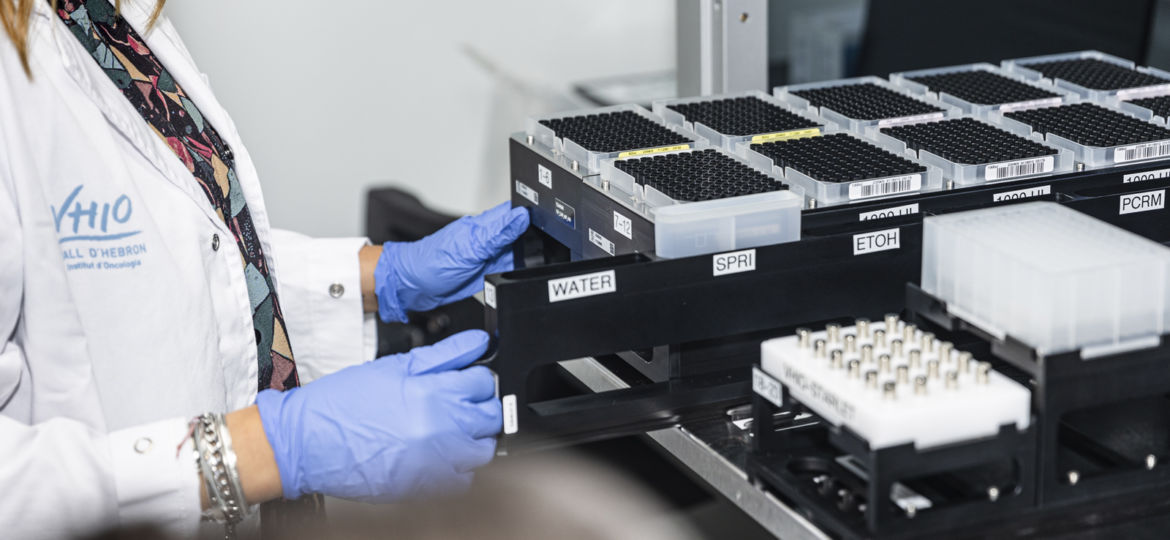
Cancer is increasingly prevalent in society and the efforts of the research community, doctors and administrations to find solutions to this disease are huge. However, it cannot be treated in a uniform way, as there are more than 200 types of cancer. In addition, the disease in each patient is unique, because the mutations that give rise to the development of each of the tumors are different in each case.
A five-year European project, led by the IRB, which has received 10 million euros from the European Commission, seeks to interpret the profiles of mutations in a specific tumour so that medical doctors can choose the most appropriate treatment for each patient. The platform that analyses potential susceptibilities of each tumour is called Cancer Genome Interpreter and it uses machine-learning and other computational methods to systematically extract information from mutations observed in thousands of tumours—28,000 tumours from 66 types of cancer analysed to date—to improve the interpretation of the variants observed in each patient. The Cancer Genome Interpreter identifies those mutations that are important for cancer development and those that may be related to the response to a given treatment. On this basis, a prediction can be made of whether a specific drug can be effective against that tumour or whether the tumour is likely to be resistant to the treatment. With this information, the system provides a report to help medical doctors to make decisions about treatment options.
“The Cancer Genome Interpreter, which we have been working on for more than five years, has immense potential and, through this project, we intend to optimise it for its use in hospitals and healthcare centres. We want it to be a key instrument to support the decision-making by clinical oncologists, so that each patient, regardless of the hospital in which the diagnosis is made, receives the most appropriate treatment”, explains Dr Núria López-Bigas, ICREA researcher and head of the Biomedical Genomics lab at IRB Barcelona, who leads this project.

The project also envisages the establishment of a Molecular Tumor Board (MTB), made up of international specialists in different fields relevant to the interpretation of genomic data, which will meet virtually on a regular basis. These experts are in top European health centres and have extensive experience in this field. The MTB will help the oncologist to interpret the results of the patient’s genomic tests and integrate them into the clinical case. This part of the project is led by Dr Ana Vivancos, Head of the VHIO Cancer Genomics Group, and her goal is to encourage the exchange of knowledge to provide optimal therapeutic management to all patients regardless of the centre of care.
“This tumor committee will be made up of the best European experts in genomics, as well as oncology, pathology, genetics or molecular biology. This team will meet regularly to discuss cases and help the oncologist make decisions about the best treatment options for to his patient, integrating the results of genomic tests that have been performed within the clinical course. In short, the goal is that although this level of experience is found mainly in large centres, hospitals and smaller centres they can easily access expert opinions”, says Dr Vivancos.
17 partners for an ambitious project
As well as patient associations, IRB Barcelona will be collaborating with 17 different types of European organisations, which offer complementary expertise to address the implementation of personalised cancer medicine from all angles.
Nine hospitals and healthcare centres from four European countries are partners of the project and these will be the first to introduce the platform into their systems: the Vall d’Hebron Institute of Oncology (VHIO); the Gustave Roussy; the Leon Berard Centre de Lutte Contre le Cancer; Uniklinik RWTH AACHEN; Uniklinik KÖLN; the Manchester Research Cancer Centre; the Instituto de Investigaciones Biomédicas de Girona Dr. Josep Trueta; the Red Assistencial Universitaria de Manresa Althaia and the Andalusian Health Services, as well as the Catalan Institute of Oncology (ICO) and the Fundación Progreso y Salud of the Regional Government of Andalusia.
Regarding research centres, in addition to IRB Barcelona, the Centro Nacional de Análisis Genómico (CNAG – CRG) is participating in the project. The company Alira Health is the partner in charge of ensuring regulatory aspects and the European Association for Cancer Research will be managing communication actions associated with the project.
#######
More information about Cancer Genome Interpreter: https://youtu.be/6Exe78fgNrk











